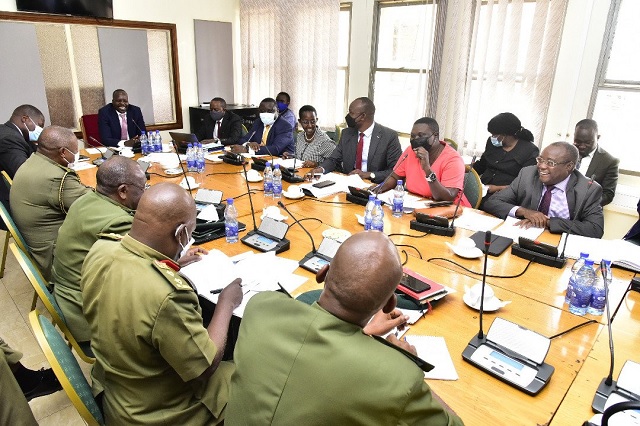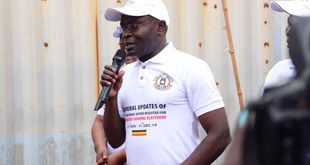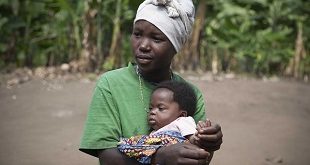
Kampala, Uganda | THE INDEPENDENT | Uganda People’s Defence Forces (UPDF) has denied operating any safe houses in the country.
The Minister of State for Defence, Jacob Oboth Oboth who was appearing before the Committee on Human Rights has subsequently asked MPs to furnish his office with any information regarding the existence of safe houses for further investigation.
“I have heard issues of safe houses even before I became Minister of Defence and my response is that we do not operate any safe houses and this committee can help us identify if there are people who are operating safe houses and are allegedly doing it on behalf of UPDF,” Oboth Oboth said.
Oboth Oboth, who on Tuesday 10 May 2022 led a team of UPDF Generals to the committee chaired by Fox Odoi, was responding to allegations of human rights violations in the country.
The committee that is currently investigating allegations of human rights abuse by security forces had sought a response from the Ministry of Defence and Veteran Affairs on the number of safe houses and their locations.
Allan Mayanja, Nakaseke Central MP referred to the minister’s response as “dodgy” and “unsatisfactory” saying the Ministry of Defence and UPDF ought to do better in probing the alleged existence of safe houses, which have turned into torture chambers for suspects.
“I think the minister is just dodging the question of safe houses because I am sure there is a department for investigations in the UPDF and the issue of safe houses has been raised by Ugandans. It is unfair to tell us (MPs) to look for these safe houses. The UPDF should investigate and come up with a report,” Mayanja said.
Geoffrey Charles Okello, Nwoya East legislator also subscribes to the view that the Ministry of Defence takes the allegations of existence of safe houses seriously and investigate them thoroughly saying, ‘there is a likelihood that these safe houses are being manned by the investigative arm of the security forces’ and that MPs’ efforts to locate them could turn futile.
“The response from the minister on safe houses does not mean that they do not exist; perhaps they are operated by the investigative arm of the military or police and other security forces. So, even if we struggle to find out where they are, we are less likely to break through since the investigators are the ones operating them,” Okello said.
Fox Odoi said that there is some progress in respect of the existence of safe houses following a recent report from Uganda Human Rights Commission (UHRC), a body that serves to monitor and advance human rights in Uganda.
“Uganda Human Rights Commission reported to us that all previous safe houses were closed and we still have not come up with any known locations of a safe house. So it wouldn’t be fair to insist that the minister gives us a list yet even UHRC says they were all closed,” Odoi said.
This is not the first time Parliament is investigating allegations of human rights abuse in relation to the existence of illegal detention centers commonly referred to as safe houses.
According to the November 2019 report of the Committee on Human Rights that first investigated this matter, the then Minister of Security, Gen Elly Tumwine acknowledged the existence of safe houses in different locations where operations deem them fit to fulfill their purpose and functions as provided in the Security Organisations Act Cap. 305 of 1987.
Tumwine told the committee that “safe houses are there to coordinate clandestine intelligence information and to secure and protect witnesses in danger, especially criminals who have turned into witnesses.”
Col Deo Karikona, the Director, Human Rights-UPDF defended UPDF’s continued trial of civilians in the General Military Court saying it is premised and sanctioned by the law under section 119(g) and (h) of the UPDF Act, 2005.
According to the law, any person not otherwise subject to military law, who aids or abets the commission of a service offence or any person found in unlawful possession of equipment which is a preserve of the UPDF, shall be tried by the military courts.
Using an example of robbery case that took place in Stanbic Bank at Cham Towers in 2007 where a civilian orchestrated a bank robbery using his armed brothers who were UPDF soldiers, Col Karikona said the definition of a service offence under UPDF Act, does not only include offences stipulated under the act, but includes offences under the penal laws.
*****
SOURCE: UGANDA PARLIAMENT MEDIA
 The Independent Uganda: You get the Truth we Pay the Price
The Independent Uganda: You get the Truth we Pay the Price



I think the minister has done his part by updating the nation as there no safe house.But as if this is not enough to convince every one.I would suggest that the issue needs serious investigation by involvement of other stakeholders put on board.
Safe house is needed in every nation..